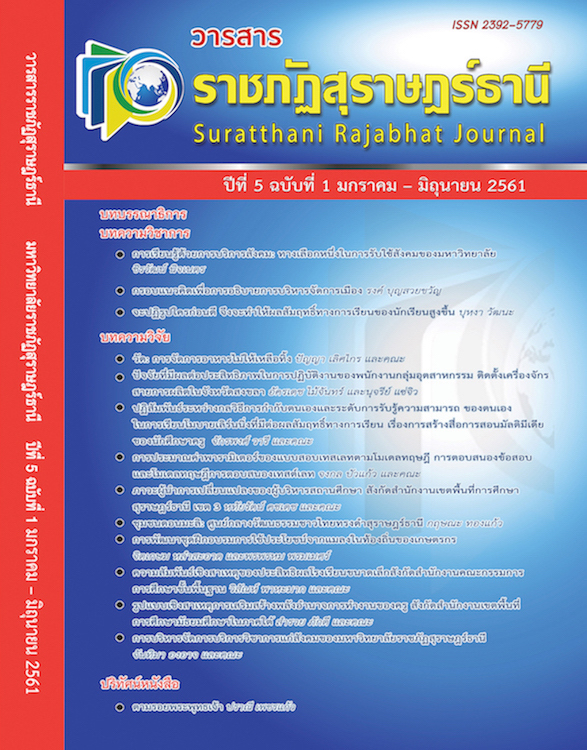Development of a Training Package on Utilization of Local Insects of Farmers
Main Article Content
Abstract
This research was aimed 1) to study the utilization and understanding of local insects by the farmers in Surat Thani Province, 2) to develop a training set on utilization of local insects by the farmers, and 3) to study the effectiveness of the training set and the training result. Seventy farmers in Surat Thani Province were interviewed with the aid of a standard form to compile the utilization methods. A focus group discussion comprising of 10 members representing farmers and parties involved was carried out in order to setup a guideline for the training set development. Later on, 33 organic farmers were purposively selected and trained with the developed training set.
It was found that thirteen kinds of insects were utilized as food, namely Rhynchophorus ferrugineus, Tenebrio molitor, Lepidiota stigma, Dundubia intermerata, Oecophylla smaragdina, Vespa affinis, Apis mellifera, Apis cerana, Apis dorsata, Tetragonula pegdeni, Odontotermes spp., Achaea janata, Gryllusbimaculata while red ants, wasps, breeding bees and stingless bees were employed in helping increase agricultural products. Besides, the research also showed that the farmers did not know the importance of local insects; therefore, training was needed. Furthermore, the developed training set comprised 5 parts which were knowledge of local insects, prevention and elimination of pests with biological methods, traps, rearing stingless bees (Tetragonula sp.), and rearing mealworms (Tenebriomolitor). Test papers with the difficulty value of 0.39-0.76, the discrimination value of 0.22-0.46, and the reliability value of 0.89 were included. The training set indicated the efficiency value of 83.46/84.60 according to the criteria of 80/80. After the employment of the training set, the average scores of pretest and posttest of participants were at 14.12 and 26.52 respectively at the reliability level of .05. Consequently, the participating farmers agreed on the appropriateness of the training at a high level ( = 4.32).
Article Details
References
จินตนา หย่างอารี. (2551). แมลงกินได้ อร่อย มีคุณค่าแต่... หมอชาวบ้าน, 353 (30) : 18-25.
มูลนิธิเอสซีจี. (2555). โครงการเพื่อเด็กและเยาวชนการสร้างจิตสำนึกรับผิดชอบต่อ สังคม [Online]. เข้าถึงได้จาก http://www.scgfoundation.org/th/ children And Youth Detail.asp?id=26 (2555, กรกฎาคม 13).
เมธี ปิยะคุณ และสุรชัย เลิศธนาผล. (2551). การพัฒนาชุดฝึกอบรมแบบ e-Training เรื่องทักษะการสอนงานสำหรับหัวหน้างาน. มหาวิทยาลัยสุโขทัยธรรมาธิราช.
ฤทธิ์ วัฒนชัยยิ่งเจริญ. (2553). แนวทางการดูแลและรักษาความหลากหลายทางชีวภาพ [Online]. เข้าถึงได้จาก : http : www.Trueplookpanya.com/true/knowledge (2553, ตุลาคม 10).
สิทธิชัย นันทรัตน์กุล สุนทร พูนเอียด และสนชัย ใจเย็น. (2558). การพัฒนาหลักสูตร ฝึกอบรมดูแลเยาวชนให้ปลอดจากยาเสพติดสำหรับผู้ปกครองนักเรียน ชั้นมัธยมศึกษาปีที่ 3 โรงเรียนสุราษฎร์ธานี. วารสารราชภัฏสุราษฎร์ธานี, 2 (2) : 59-75.
สุพจน์ พรหมรักษ์. (2552). การพัฒนาชุดฝึกอบรมวิชาชีพสำหรับผู้ต้องขังเรือนจำ ชั่วคราวห้วยกลั้งสังกัดเรือนจำอำเภอหลังสวนจังหวัดชุมพร. วิทยานิพนธ์ ศิลปศาสตรมหาบัณฑิต สาขาวิชาสังคมศาสตร์เพื่อการพัฒนา มหาวิทยาลัย ราชภัฏสุราษฎร์ธานี.
สมนึก บุญเกิด. (2551). การจัดการรังผึ้งจิ๋วเพื่อเพิ่มศักยภาพของผลผลิตทางการเกษตร. กรุงเทพฯ : คณะวิทยาศาสตร์ มหาวิทยาลัยรามคำแหง.
โสภณ บุญล้ำ. (2556). คู่มือเพาะเลี้ยงหนอนนก. สุราษฎร์ธานี : มหาวิทยาลัยราชภัฏ สุราษฎร์ธานี.
อนุวัตร ชัยเกรียติธรรม และคณะ. (2553). การพัฒนารูปแบบการฝึกอบรมครูสอน ภาษาอังกฤษแบบค่ายกิจกรรม. วารสารมหาวิทยาลัยราชภัฏมหาสารคราม, 4 (1) : 121-129.


